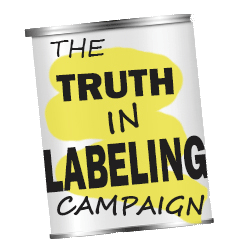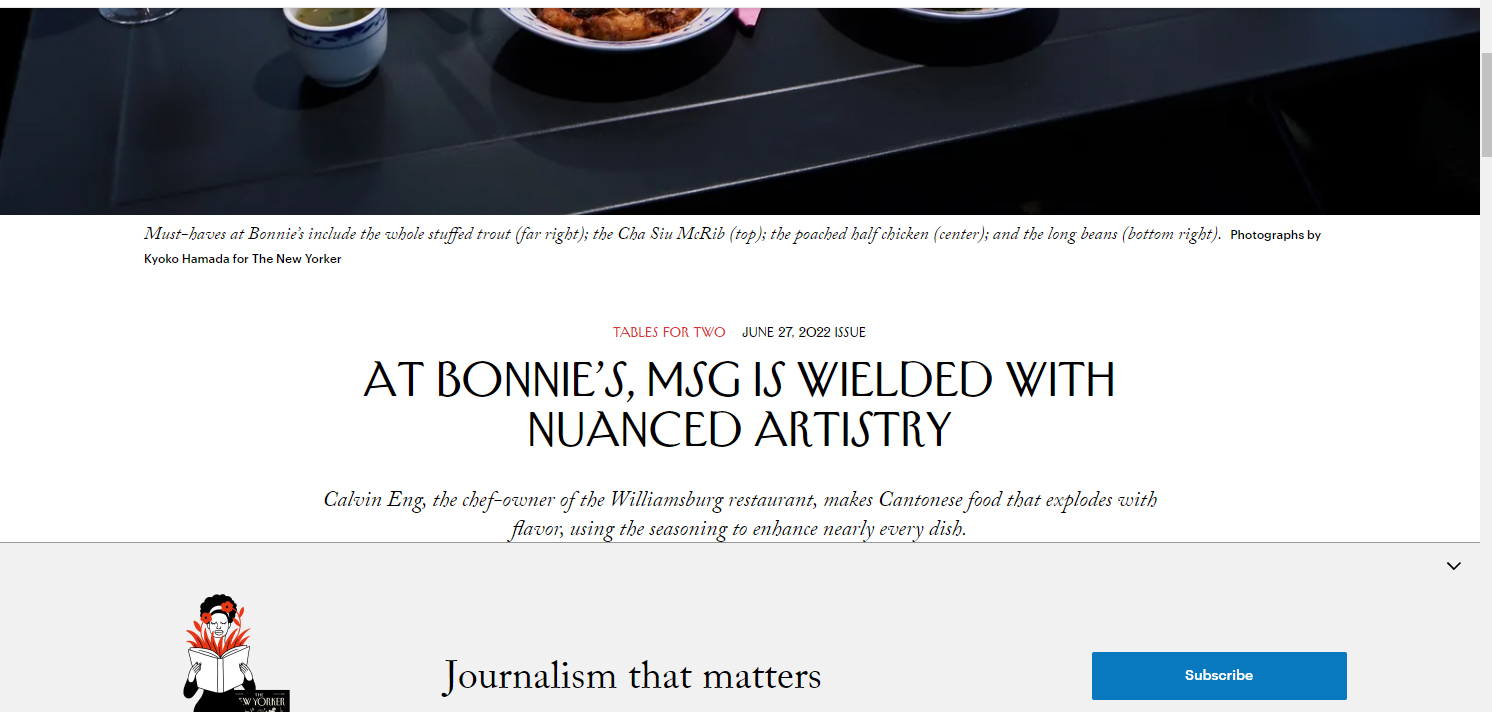Letter sent to New Yorker editor David Remnick. He has yet to respond.
David Remnick
Editor
The New Yorker
Conde Nast
1 World Trade Center
New York, NY 10007
Dear Mr. Remnick,
I am writing to you personally, rather than sending this as a standard letter to the editor, to express my extreme indignation at your magazine’s having spread a blatantly false, misleading and, to a good many people, hazardous piece of industry-generated propaganda under the guise of a restaurant review.
The article to which I’m referring, which appeared both online and in your June 27 issue (and which has just been brought to my attention, or I would have written you sooner) is headlined in the online edition, “AT BONNIE’S MSG IS WIELDED WITH NUANCED ARTISTRY.” The author, Hannah Goldfield, is not only listed as the New Yorker’s food critic but was apparently a former fact-checker for your magazine –which is all the more reason why the outright falsehoods it contains are ones I find so outrageous, being the co-founder and director of the Truth in Labeling Campaign and author of a just-released book titled The Perfect Poison (which details many of my comments here).
To cut to the chase, what Ms. Goldman states at the beginning of this “review”—that “the claim that monosodium glutamate, or MSG, is inherently unhealthy has been thoroughly debunked” is an out-and-out lie—one originating in a disinformation campaign spearheaded by Ajinomoto, a major manufacturer of MSG, and deliberately disseminated using cooperative media outlets to convince people that the negative things they’ve heard about the health effects of the flavor enhancer are baseless rumors.
But it’s not the only falsehood in which Ms. Goldman engages. She also describes MSG as “a salt that’s extracted from fermented crops such as sugarcane and corn” and that MSG “occurs naturally in foods including tomatoes and Parmesan cheese” and furthermore, as being “as harmful as table salt, maybe even less so.”
In reality, there is nothing “natural” about this additive. Monosodium Glutamate is always manufactured. The “found in nature” line is nothing more than spin lifted straight out of the literature of the Glutamate Association. Unlike the bound glutamic acid that occurs in commodities such as tomatoes and Parmesan cheese, as well as meat, grains and vegetables, MSG is comprised of manufactured free glutamate most often produced by using genetically engineered bacteria that secrete glutamate through its cell walls. Manufactured free glutamate will always contain impurities that industry has been unable to remove. MSG does not occur naturally in anything.
While some people might not notice an immediate reaction to ingesting this manufactured flavor enhancer, for others, the effects can be disastrous, resulting in symptoms that can be mistaken for Alzheimer’s or can send someone to the ER. Even the American Heart Association acknowledges it can be a trigger of atrial fibrillation, or AFib.
Another serious consequence of MSG consumption is the neurological damage it can do to children whose blood-brain barriers aren’t fully developed, as well as to many older people by virtue of its being considered an “excitotoxin”—that is, a substance that can literally excite certain brain cells to death, as the late Dr. John Olney, a neuroscientist from Washington University in St. Louis, discovered in the course of his research, leading to its removal from baby food.
Beyond all these health considerations, is the absurd notion expressed by Ms. Goldfield that using MSG is a form of “nuanced artistry” in cooking. This is a lot like saying that the use of performance-enhancing steroids is a form of “nuanced artistry” in athletics.
Lastly, I have to say how personally offensive it is to me, as a degreed educational psychologist and holder of a Ph.D. to have it implied in a nationally respected magazine that I’m guilty of “thinly veiled racism” because I expose the propaganda put forth by the glutamate industry and help the public to decern truth from fiction. How dare your writer make such a totally unfounded and defamatory statement!
In closing, I can only hope that you will take my concerns seriously, make some attempt to retract these fallacious and potentially harmful statements and instruct your writers not to act as conduits for industry propaganda in the future (and your “fact checkers” to make sure they don’t).
Sincerely,
Adrienne Samuels, Ph.D.
Director, The Truth in Labeling Campaign
www.truthinlabeling.org / truthlabeling@gmail.com


